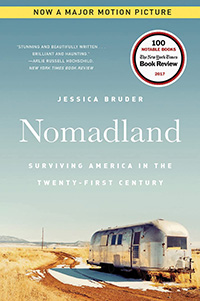 Jessica Bruder, Nomadland: Surviving America in the Twenty-First Century (New York: Norton, 2017), 273pp.
Jessica Bruder, Nomadland: Surviving America in the Twenty-First Century (New York: Norton, 2017), 273pp.
I read Jessica Bruder's award-winning book after watching the film adaptation of the same title. The movie Nomadland was the breakout favorite of the year when it debuted at the Venice Film Festival in September 2020. Professional critics and everyday fans heaped praise upon the "Neo-western drama" that was written, edited, and directed by Chloé Zhao. It earned six nominations at the 93rd Academy Awards, and won the Academy Award for Best Picture, Best Director, and Best Actress.
My wife and I thought the film was a little cliched, sanitized, and even romanticized, but you'd never say that about the book. Bruder documents a "new kind of wandering tribe" that's similar to but different from wandering hobos and grifters, or today's largely Latino migrant farm labor. Her subjects are mainly white and middle-class in their appearance, mindset, background, and experiences, or at least they used to be. These people have turned their backs on the American Dream, which they feel has betrayed them, and taken to living full time in their vehicles and on the road. They drive to successive part-time employment destinations all over the country.
Bruder follows a dozen or more employment nomads, but organizes her narrative around a sixty-four year-old grandmother named Linda May. We meet Linda when she works as a "campground host" in the San Bernardino National Forest from May to September. She earns about $9 an hour and works a thirty-hour week. She then moves to one of Amazon's infamous CamperForce destinations that depend upon the low-wage labor. Amazon warehouses can be as large as 19 football fields and contain 22 miles of conveyor belts. Mays then drives to the annual Rubber Tramp Rendezvous in Quartzite, AZ, where we get a taste of the hope, humor, community, resourcefulness and resilience of these colorful vagabonds.
Lots of the employment literature about these hard-working nomads invokes "cheery platitudes" about making new friends, traveling the country, enjoying a quirky hobby, and basking in a "sunny lifestyle." But for most people it is a survival strategy in the "most unequal country in the world." It's a story of mainly elderly people who have been left in the economic dust and are trying to "radically reimagine their lives." In Bruder's nuanced view, these people are "neither powerless victims nor carefree adventurers." She bought her own used van, and traveled 15,000 miles in three years to embed herself in the beet harvest in North Dakota and at an Amazon warehouse. It's a far cry from the stylized movie version, and not something you would wish for your grandparent. At the end of her book she compares these creative and brave people to what scientists call an "indicator species." That is, they are "sensitive organisms with the capacity to signal much larger shifts in the ecosystem." That's an ominous signal.
Dan Clendenin: dan@journeywithjesus.net


